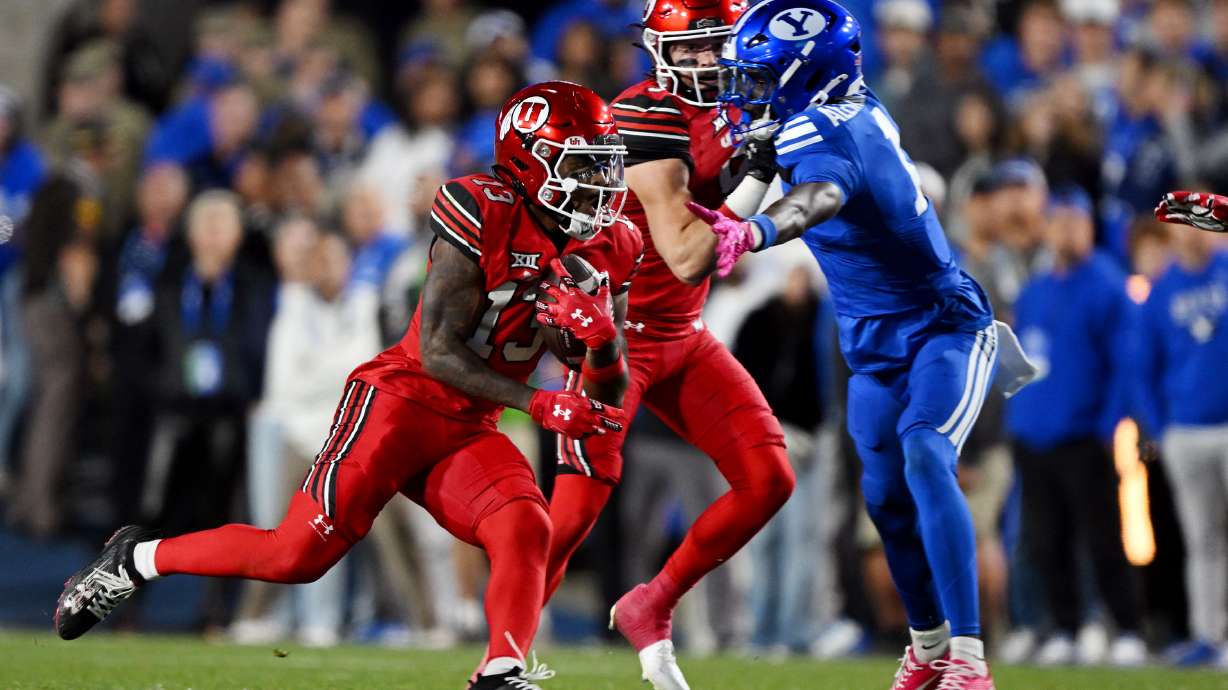
With 2 conference losses, where does Utah football go from here?
SALT LAKE CITY — With a raucous scene still engulfing LaVell Edwards Stadium, a frustrated Devon Dampier attempted to find the answers for a path forward after BYU pulled away for a 24-21 win over Utah Saturday night.
With two Big 12 losses just four games into the conference slate, the path to a potential conference title got all the more difficult after Utah failed to convert in the red zone at times and gave away a chance at the all-important rivalry win in hostile territory.
Sure, the loss stung double because it came against a hated rival, but there was a belief ahead of the game that Utah was supposed to be the one celebrating Saturday night — most projections and betting lines had the Utes as the favorite — and so a loss seemed unfathomable for the road team.
Though just a 3-point loss, the ending of the game felt anything but close, even as Utah narrowly missed on a chance to recover an onside kick late in the game. Utah made mistakes and BYU didn’t. Simple enough.
Utah had moments of playing as the aggressor, outgaining BYU 470 yards to 368 yards, but it all went out the window when the Utes had three turnovers on downs, two turnovers — a muffed punt recovered by the Cougars and an interception — and committed 12 penalties.
Each proved more costly than the next, like dying by a thousand paper cuts.
“We’re not happy,” Dampier said. “We know what our team is capable of. We had aspirations to be undefeated after our first loss, so it hurts us right now.”
It hurt even more considering that Texas Tech, the team that beat Utah weeks prior, suffered a loss to Arizona State — the team Utah dominated a week earlier — minutes before the rivalry game kicked off to give the Utes a clearer path to a championship date in Arlington, Texas.
Favored in every remaining contest, according to several projection models ahead of the game, the path was set for the Utes.
That path is now muddied and almost certainly out of their own control — at least in totality. The Utes can still win out for a chance at a trip to Arlington, but it will now be reliant on others within the conference to help Utah along the way, which is not a great position of confidence.
Utah still has a favorable path — the Utes remain the favorite in the final five games of the regular season, according to TeamRankings — but now has just a 6.5% chance of winning the conference, which ranks below the favorites of Texas Tech (53.0%) and BYU (18.1%), as well as Cincinnati (11.6%) and Arizona State (6.7%).
In fact, a loss to BYU and an Arizona State win on the same weekend made it even more likely that one of the two, as well as Texas Tech, will be in Arlington instead of Utah.
But that’s also assuming the three go unscathed in the final stretch of the season — and at least BYU and Texas Tech have to play each other, so one team will suffer a loss along the way.
“We’ve been in this situation before,” Dampier said. “We’ve lost the football game before, and we bounced back just fine. So, you know, I’ve got full trust in my team still. This game doesn’t change that. I think we’ve still got a strong team all around. Hopefully we’ll show that to the world.”
A win Saturday in a late-night tilt with Colorado (8:15 p.m. MDT, ESPN) at Rice-Eccles Stadium will help turn the tide for Utah — the Utes are favored by 14.5 — but a shot at a conference title is likely out of the equation with five games left in the season.
Unless the teams around Utah help out, but nothing is guaranteed.
For now, Utah will continue to shoot for a double-digit win season, which will give the team a shot. But even at 10-2, those chances may still come up short based off a pivotal week of conference games.
“You go from elation to devastation in a seven-day period of time, and back and forth, but that’s what you sign up for,” Utah head coach Kyle Whittingham said. “I mean, that’s the nature of this business.”
For the head ball coach, who returned to the Utes for at least one more season based off the sour taste left after a losing season, it may not be the exact fairy tale ending hoped for, but it still can be considered a success in the end.
The Key Takeaways for this article were generated with the assistance of large language models and reviewed by our editorial team. The article, itself, is solely human-written.
First Appeared on
Source link






